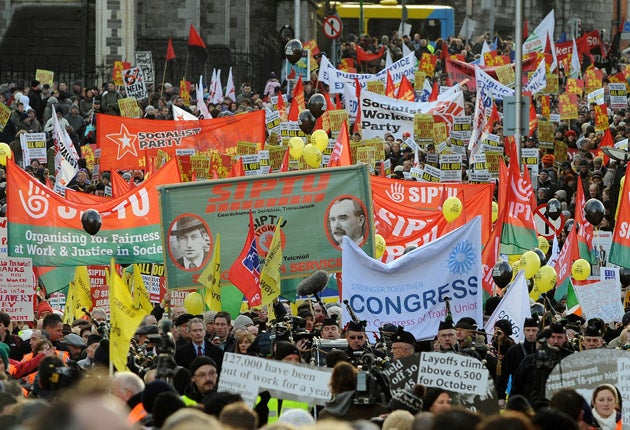Europe agrees to €85bn bailout of Irish economy
Finance chiefs hope stability mechanism will spare others

European finance ministers last night approved an €85bn (£72bn) bailout of Ireland's troubled economy.
The deal – which includes €35bn to recapitalise the country's punch-drunk banking system and €50bn for day-to-day government spending – follows intensive negotiations yesterday.
The EU now hopes a new "permanent" system will resolve the eurozone's spreading debt crisis and prevent Portugal and, crucially, Spain from being forced to seek similar emergency aid. They are seen as the next two "dominos" under threat despite repeated denials from their governments that they will need financial help.
EU ministers were keen to finalise a deal in Brussels last night before the start of trading in Asian markets marked the end of the weekend's "window of opportunity" for action.
The Irish government said the average interest rate it would pay would be "of the order of 5.8 per cent per annum" if the all the funds were to be drawn today. The final figure will depend on the timing of the drawdown and on market conditions.
The interest rate has been one of the major sticking points of the plan, with the German Finance minister, Wolfgang Schäuble, reportedly arguing for a "punitive rate" of up to 7 per cent. Unsurprisingly, Ireland wanted to pay considerably less, and was backed by Britain, which is keen to see a return to stability for its neighbour and fifth-biggest trading partner.
While the lion's share of the funds comes from the eurozone, and Germany in particular, Britain and other non-eurozone countries including Sweden and Denmark have offered bilateral aid.
However, such bailouts, following a similar package of measures to help Greece, have become increasingly unpopular in Germany, whose citizens resent paying for what they see as the cavalier actions of debt-ridden nations on the fringes of Europe.
Jean-Claude Juncker, who leads the group of eurozone finance ministers, said: "Ministers concur with the commission and the European Central Bank that providing a loan to Ireland is warranted to safeguard financial stability in the euro area and in the European Union as a whole."
The package will result in the effective nationalisation of Allied Irish Banks and Bank of Ireland, which the Finance minister, Brian Lenihan, had described as the "first Irish bank" to emerge from the financial crisis following a cash call in April.
Mr Lenihan attended the meeting in Brussels but will return to a political crisis which is likely to see him and his Fianna Fail party ejected from office following increasing anger across the republic at the austerity measures enacted as a result of the crisis.
Bondholders who lent money to the Irish banks are, however, likely to be relieved because they are no longer facing a "haircut" on their holdings as a result of the bailout. The Prime Minister, Brian Cowan, said the EU did not want these senior bank bondholders to help pay for the bailout because of the potential problems that would create across the rest of the eurozone.
As part of the package, EU ministers have given Ireland an extra year to reduce its budget deficit to 3 per cent, meaning it has to reach the target by 2015 rather than 2014. The government said it did not expect to need to draw on all the available funds.
With attention now set to shift to Portugal, it emerged that that country was discussed at yesterday's meeting. The EU said it "welcomed" Portugal's plans for structural reform.
Subscribe to Independent Premium to bookmark this article
Want to bookmark your favourite articles and stories to read or reference later? Start your Independent Premium subscription today.

Join our commenting forum
Join thought-provoking conversations, follow other Independent readers and see their replies